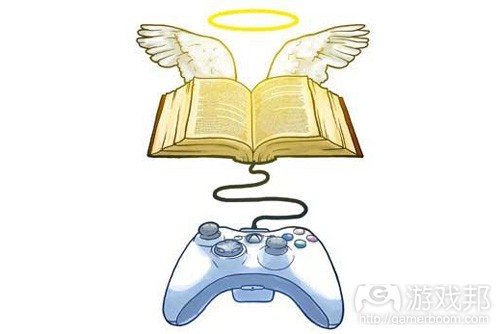对游戏成为故事媒介的愿景和质疑
作者:Leigh Alexander
听过游戏行业最主要支持者,尤其是批判媒体的言论,你就会知道我们最想要的其实是一种故事叙述媒介。事实上,这也是电子游戏最需要的发展方向。至少,当我们面对无信仰者之类的人群时,这是听起来最好的回答。“那些东西难道不是充斥着暴力内容吗?”你年老的邻居会发出这种疑问,此时你可以说:“有些确实如此,但是我感兴趣的是那些讲述绝妙故事的产品。”
当你在酒吧中告诉他人,你的工作与电子游戏相关时,他们可能会问你“那你一整天的工作只是玩游戏了?”他们带着怀疑的眼神,觉得你仍像个孩子一样花数个小时玩马里奥游戏,此时你就可以向他们解释,你感兴趣的是游戏将成为下个绝妙的叙事媒体。你将游戏比作电影行业,不只是因为两者都是鲜活的现代娱乐形式,还在于这两种媒体都有大量和精心构建的主流精华作品。当然,这些作品都讲述了绝妙的故事。
我们提到的总是故事,好像这个元素能够让每个人相信游戏的良好本质。当然,游戏玩法的改良令我们感到异常兴奋,但是这种技术创新受到潜在的文化蔑视,AAA游戏的逼真效果似乎暗示它本身就缺乏灵魂。
我们很难弄清楚是否以及何时需要呈现绝妙的故事,我们希望将来会出现某些想象中的传奇电子游戏,希望有一天当我们谈论其自己的工作时,看到的是赞赏和羡慕的表情,而不是充满疑问的目光。或者当我们回首往事,回想那些伴着我们成长的游戏时,如果没有我们的怀旧情愫,那种体验就不能再重现了吗?
无论我们追求的是何种感觉,似乎都没什么意义,因为我们可以看到游戏行业和市场逐渐偏爱的产品类型并无法帮我们获得上述感觉。单人战役通常被视为是多人游戏的演练。如果说体验故事剧情这种想法在上个时代仅仅是不受人欢迎,那么在这个时代它已经濒临灭绝。
游戏的故事情节逐渐成为承载动作内容的载体,个人体验被设计成是紧张多人体验的缓冲物。RPG的目标是通过叙事来驱动,但是它们越来越倾向于古老的做法,其深度与传统的科幻小说无异。那么,当人们为获得文学体验而进入书店时,是否有人会径直走向有关龙和宇宙飞船的平装书呢?或许RPG开发者会这么做,但这不是足以解决问题的方法。
AAA游戏市场的竞争性甚于以往任何时候。设计必须防备盗版,游戏必须感觉起来足够好玩,这样人们才会继续玩游戏,随后才有可能付费购买更多内容。目前的游戏题材和规则单一,至少那些市场巨作呈现出的是这种状况。主流玩家似乎都不愿意放弃那些已经在市场确立地位的游戏,体验未被证实确有趣味性的“叙事”成分。
当然,他们的做法也不应遭到埋怨。游戏故事讲述中真正优秀的内容并不多,往往都只有片刻。比如,在《荒野大镖客》中,当我们骑马进入墨西哥之时。我们根据自己与故事在特定环境中互动时的感觉来评估其质量,对比那种可以主宰故事发展的感觉和设计师控制故事的感觉。当有关战争伦理的游戏根据我们对待敌人的态度来做出相应评价时,我们会感到欣喜,即便我们已经不记得战争故事本身的细节内容。
更普遍的情况是,这些绝妙的时刻是偶然显现的,是由玩家自己发现的。有时,我们认为某款游戏很棒,于是我们想要成为讲述故事的人,兴奋地同好友分享游戏中的细节,比如我们在游戏的独特之处有何体验、我们如何用不同的方法解开谜题以及我们在游戏中遇到了什么事情。在我看来,相对于背下《半条命》的整个故事情节而言,人们更有兴趣分享《马里奥赛车》中的刺激体验。
机制所产生的兴奋感和失败产生的挫败感比我们观看电影或阅读书籍时产生的感觉更加有形和具体。向从未经历过互动娱乐的独特体验的人描述那种感觉并不是件容易的事。当我们在描述游戏的吸引力时,往往会用到“有趣”这个词,但事实上它并无法真正描述那种感觉。并且,它同“成熟的叙事”也毫无关联。
或许,是时候接受游戏并非“故事讲述媒介”,至少不是我们所希望的那种能够凭借游戏故事而获得美国编剧协会授予奖项的“故事讲述媒介”。
真相究竟是什么,我也无从得知。
游戏邦注:本文发稿于2012年3月19日,所涉时间、事件和数据均以此为准。(本文为游戏邦/gamerboom.com编译,拒绝任何不保留版权的转载,如需转载请联系:游戏邦)
Opinion: Tale spin
Leigh Alexander
Listening to gaming’s most arch supporters, particularly the critical press, you’d think that what we want most – indeed, what videogames most need to move forward – is to be a storytelling medium. At least, that’s the definition that sounds best when, for example, we’re confronted with a nonbeliever. “Aren’t those things incredibly violent?” blinks your elderly neighbour, and you say: “Some are, but the ones I’m interested in tell great stories.”
Or when you tell someone in a bar that your job is videogames, and they ask if you “just play videogames all day” in a fashion that seems derogatory. As their incredulous gaze finds you an adult-child still spending hours on Mario, you hasten to explain that you’re interested in games as the next great narrative medium. You compare games to the film industry – not just because both are valid modern entertainment, but because, as you tell your saucer-eyed acquaintance, both have their horrible, obvious, explosion-laden mainstream entries and their thoughtful, well-crafted gems. That tell great stories, of course.
Always about the stories, as if it’s that element that will convince everybody of gaming’s natural greatness. Certainly, we become excited about gameplay advances, but there’s almost an inherent cultural disdain toward the onward march of technological polish, as if triple-A fidelity automatically implies a loss of spiritual authenticity.
It’s difficult to tell whether, when we demand great stories, we’re looking ahead to some imagined glory and legitimacy for videogames, to a day when discussing our work will bring admiring nods instead of quizzical blinking. Or are we looking back, to some youthful escapism with the games that raised us, an experience that can’t possibly be recreated without the lens of nostalgia?
Either way, it doesn’t actually make a lot of sense, when we look at the shape of the gaming landscape and the kinds of products the market increasingly favours. A singleplayer campaign is generally viewed as training for the multiplayer. If the idea of an authored experience had begun to enter disfavour in the last generation, it’s an endangered species in this one.
The plot of a game is increasingly a rig on which to hang action sequences, individual experiences designed to be breathtaking, adrenaline-fuelled or scary. There are RPGs that aim to be narrative-driven, but they cling steadfastly to ancient tropes, no deeper than the traditions of high fantasy and sci-fi. And is there anyone who, entering a bookstore looking for a literary experience, heads straight for the paperbacks about dragons and spaceships? Well, maybe RPG developers do, and that’s half the problem, but that’s an issue for another time.
The triple-A market is more competitive than ever. Design must take primacy; games must be made that feel good to play so that people will take them online and keep playing them, and buy more content later. Genre is iron-girdled and rule-bound, at least among the games that earn money. Few among the major players are interested in straying from those established rulesets over something as diaphanous and unproven as ‘narrative’.
Can’t blame them, either. Great moments in game storytelling are often exactly that: moments. That time you were riding into Mexico during Red Dead Redemption. Andrew Ryan and a golf club. The time you had to accept you couldn’t take a little cube with a heart on its face with you. We evaluate games’ storytelling based on how it feels to interact in their environment, how much the moments feel like things we own, versus set-pieces that are sculpted for us. We’re pleased when a game about ethics in war evaluates us on how we deal with our enemies – even when we can’t remember the details of the war story itself.
Even more often, those great moments are accidental, player-discovered. Sometimes we know that a game is great when we want to be the ones to tell its story, excitedly sharing details with friends about how we experienced a discrete part of the game differently from one another, how we took different approaches to a puzzle and what happened to us. I’ve seen people more excited to share the trials and tribulations of a few laps of Mario Kart than to recite the entire plot of Half-Life.
The thrill of mechanical success, and the frustration of failure, can be more tangible and gripping than what we’d feel watching a movie or reading a book. It’s not easy to describe to people who have never had interactive entertainment’s unique experiences that can’t be replicated passively. The word ‘fun’, to which we default when we’re poor at describing games’ appeal, doesn’t really describe it. But it has nothing to do with ‘sophisticated narratives’, either.
Perhaps it’s time to accept that games aren’t a ‘storytelling medium’ – not in the way we mean when we get super excited that the Writers Guild of America is handing out awards to people who write videogames, pointing grandly as if ‘we’ are validated somehow by game writers getting awards from Hollywood. Or when we look at LA Noire’s appearance at the Tribeca Film Festival in New York as a sign of ‘things to come’.
What things? I dunno, things. (Source: Edge)









































